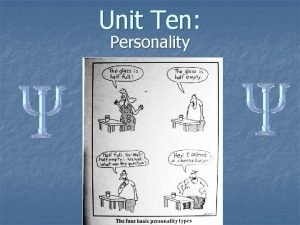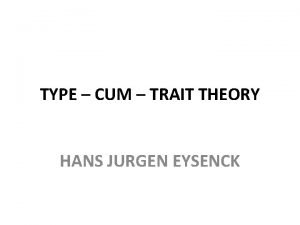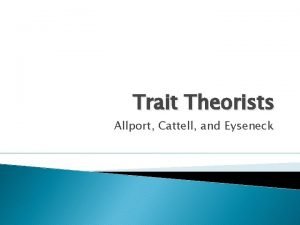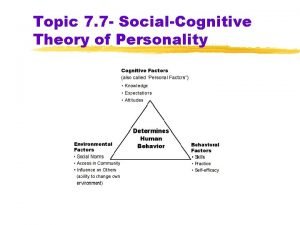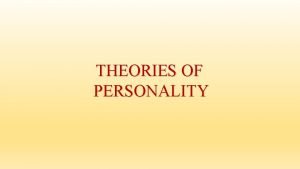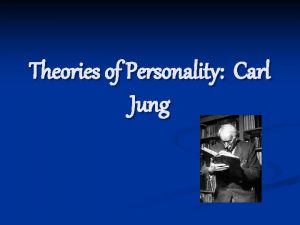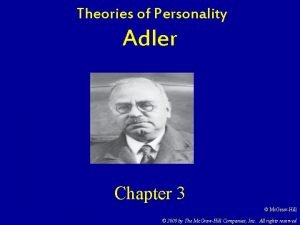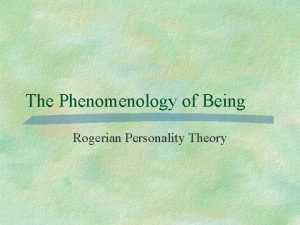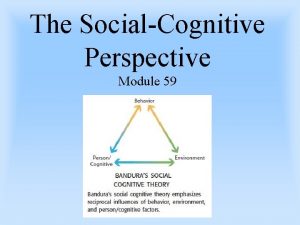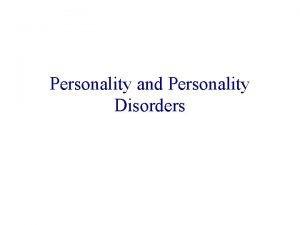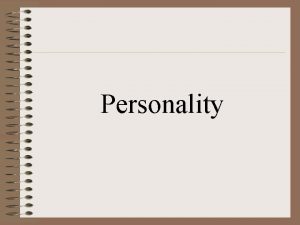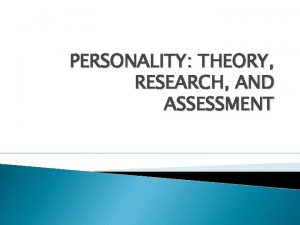Topic 7 7 SocialCognitive Theory of Personality SocialCognitive










- Slides: 10

Topic 7. 7 - Social-Cognitive Theory of Personality

Social-Cognitive Theory § Social-Cognitive Perspective § Emphasizes behavior as influenced by the interaction between persons and their social context § Proposed by Albert Bandura who believes that we learn many of our behaviors either through conditioning or by observing others and modeling our behavior after theirs

Social-Cognitive Theory § Reciprocal Determinism § the interacting influences between personality and environmental factors § Example: children’s TV viewing habits (past behavior) influence their viewing preferences (internal factor), which then influences how television (environmental factor) affects their current behavior § Essentially, we choose our environment and the it shapes us

Social-Cognitive Perspective

Social-Cognitive Perspective § Personal Control § In studying how we interact with our environment, social-cognitive psychologists emphasize our sense of controlling our environments rather than feeling helpless or at the mercy of our environments

Social-Cognitive Perspective § Internal Locus of Control § the perception that one controls one’s own fate § External Locus of Control § the perception that chance or outside forces beyond one’s personal control determine one’s fate How could both of these relate to intrinsic/extrinsic motivation?

Social-Cognitive Perspective § Learned Helplessness Uncontrollable bad events Perceived lack of control Generalized helpless behavior § the hopelessness and passive resignation an animal or human learns when unable to avoid repeated aversive events

Exploring the Self § Spotlight Effect § overestimating others noticing and evaluating our appearance, performance, and blunders § Self Esteem § one’s feelings of high or low self-worth § Self-Serving Bias § readiness to perceive oneself favorably

Exploring the Self § Individualism § giving priority to one’s own goals over group goals and defining one’s identity in terms of personal attributes rather than group identifications § Collectivism § giving priority to the goals of one’s group (often one’s extended family or work group) and defining one’s identity accordingly

Exploring the Self Value Contrasts Between Individualism and Collectivism Concept Individualism Collectivism Self Independent (identity from individual traits) Interdependent identity from belonging) Life task Discover and express one’s uniqueness Me--personal achievement and fullfillment; rights and liberties Maintain connections, fit in What matters We-group goals and solidarity; social responsibilities and relationships Coping method Change reality Accommodate to reality Morality Defined by individuals (self-based) Defined by social networks (duty-based) Relationships Many, often temporary or casual; confrontation acceptable Few, close and enduring; harmony valued Attributing behaviors Behavior reflects one’s personality and attitudes Behavior reflects social and roles
 Clincher example
Clincher example Narrowing down a topic exercises
Narrowing down a topic exercises Behaviorist theory of personality
Behaviorist theory of personality Defence mechanism sigmund freud
Defence mechanism sigmund freud Type theory of personality
Type theory of personality Allport's trait theory
Allport's trait theory Cognitive perspective of personality
Cognitive perspective of personality Allport personality theory
Allport personality theory Carl jung theory
Carl jung theory What is adler's theory of personality
What is adler's theory of personality Phenomenological theory of personality
Phenomenological theory of personality



